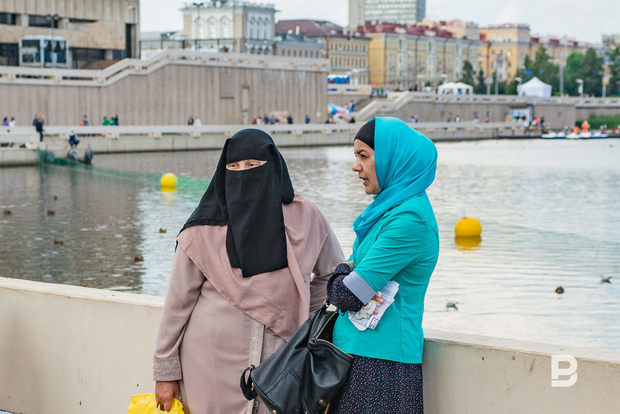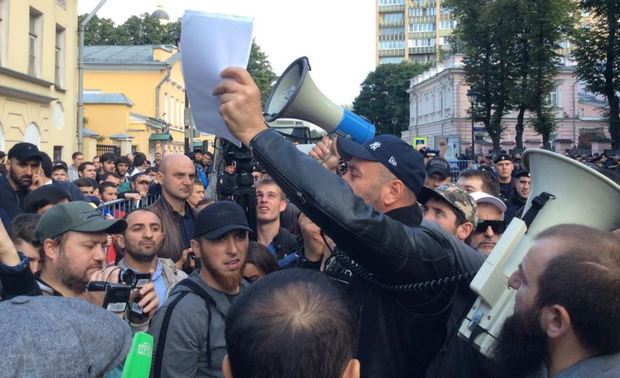''Fight for justice means realisation of Muslims’ own role in society''
What is behind the Sunday protest of Muslims in Moscow in front of the Embassy of Myanmar – in Alfrid Bustanov’s op-ed column
Realnoe Vremya's columnist Alfrid Bustanov who teaches at the European University at Saint Petersburg shares his opinion of what is behind the illegal protest of Muslims in front of the Embassy of Myanmar with readers of our newspaper. The expert saw deeper causes of what is happening behind the international agenda.
I am watching a transmission from the ground. Adult men emotionally deliver a speech: ''We are not terrorists, we are for justice'', ''Inshallah, justice will reign on this land''. In fact, they were the key words in the protest. In addition, the commenting journalist repeats like a mantra: ''People repeat ''Allahu akbar''… It seems even when people start speaking about basic values – justice, in this case – making Islam exotic in the media still prevails. How should we understand this campaign? What processes in our society is she speaking about?
We consider this quite an unexpected and unseen event differently – an illegal protest of Muslims that was not dispersed by authorities. In my opinion, it is a very important and illustrative story. Leaving the question about organisation and ''drivers'' of the protest as well as its international aspect behind brackets, I would like to share the main impression of mine: this protest says us about Muslims in Russia more than the situation with Islam in far Myanmar that the majority of protesters have a rough idea of.
Firstly, today Islam is objectively part of Russian big cities. It is possible not to build mosques, ban hijabs, close madrasahs, make a picture of dangerous Islamisation but Muslims will anyway be present in the urban space even if we shut our eyes very tightly. In an urgent situation, they can spontaneously create the agenda in this space. I think in the majority of cases our country doesn't understand this existing phenomenon – Islam as part of the modern urban culture with its own language and symbols. Therefore, there is a shock that appeared after the mass exit of Muslims on the street when Eid al-Adha almost ended and there is much time to next Eid al-Fitr.

I think in the majority of cases our country doesn't understand this existing phenomenon – Islam as part of the modern urban culture with its own language and symbols. Photo: Maksim Platonov
Secondly, the rhetoric about justice is not accidental. The protestors almost told about specifically ''Islamic'' affairs that would refer to Muslims and only they could understand them. On the contrary, they were speaking about common human values where the vocabulary of Soviet pacifism was seen: ''for world peace'', ''people of good will''. Parallels with Soviet protests in support of Vietnam appeared on the Net for a reason. In my opinion, the fight for justice, even if in such a ''Soviet'' form, means the formation of personality among Muslims – realisation of their own role in society (''we will go till the end if needed''). And this personality mainly contradicts the media perception of the Muslim community as an endless sea of migrants who bent low and spread on the city streets twice a year.
The important talk about justice brings us to the third moment – it is a projection of injustice on Russian realias. Russia is not Myanmar. But our country also has a long list of problems that gradually curl into a ball of serious contradictions. First of all, people on the Net speak about the unfair silence of the media: when terrorist attacks take place, Muslims are shown on all the channels in a bad light, and when Muslims are killed, there is no information. The reaction of traditional Islamic institutes – muftiates – is linked with the injustice. In one of the transmissions, a man asks where our official representatives are, why they kept silent. The latter rushed to renounce the illegal protest ''just in case'' because of the official position on it was not formulated. I think this situation illustratively shows the crisis of muftiates again – their big number doesn't have the time to follow dynamically developing Islamic space in big cities. Firstly, because Muslims realise themselves active creators of Islamic life.
There is a lot of young, especially in the situation when official Islam in a big city is concentrated in one-two mosques with not very authoritative activists in the lead, look for other authorities for themselves, mainly on the Internet. It is mainly a result of the historical process of Islam's individualisation that began in Russia in the 19-20 th centuries.
Ilya Varlamov noted on his Facebook page well that ''any person who wants to speak, everyone has access to the microphone, everyone says what they want. Somebody asked the people to disperse, somebody said he was ready to go to fight to Myanmar, etc. The range is opinions is huge.'' Such Islamic democracy seems to be unexpected. But I need to say that the presence of a wide ideological spectrum in the Islamic environment is the reality that doesn't come to extreme positions of loyalists and radicals or the concept of the conquered fortress of ''traditional Islam''. It is curious that such a unity in diversity was seen better in a talk about co-religionists abroad.
Search for authorities and creation of parallel networks of contacts lead young Muslims to the Internet. Hyper-Muslims have appeared on the street today – those who actively use social networks and ask to repost. Information about the injustice in Myanmar actively spread right on the Net on 4 August. And right communication channels on the Internet seemed to have provided the ''turnout'' of Muslims near the embassy of this country. ''Hot'' videos and skilfully written posts easily make this topic very popular. Here Muslims share the common culture of hyper space – selfies, a forest of raised phones to shoot a video and live transmissions from the ground. Many participants of the protest said so: ''We came here to be shown''.

In reality, we are dealing with the manifestation of social discontent that covers social values into the Islamic case. Photo: currenttime.tv
And, finally, as for very Islamic symbols of the meeting and fingers up. Addressing each other, the Muslims say in the ''Islamic language'': ''Brothers, be patient! Inshallah, everything will be solved, Wallah!'' which, of course, makes the event specific. But it can deceive. Muslims' prayer on the asphalt stopped being a flash mob a long time ago – these are realias of big Russian cities where one or two small mosques stopped accommodating tens of thousands of praying people even on Fridays a long time ago, not to mention big celebrations. In fact, salah near the Embassy of Myanmar is not an act of spontaneous diplomacy but another reminder of important problems of Muslims in Moscow. What is more, even if the majority of speakers who delivered a speech over the loudspeaker promoted the idea of justice, they repeated a purely Islamic formula of sincerity – an act ''for the sake of Allah''. In reality, we are dealing with the manifestation of social discontent that covers social values into the Islamic case. An external observer and even the very ummah haven't realised it completely yet.